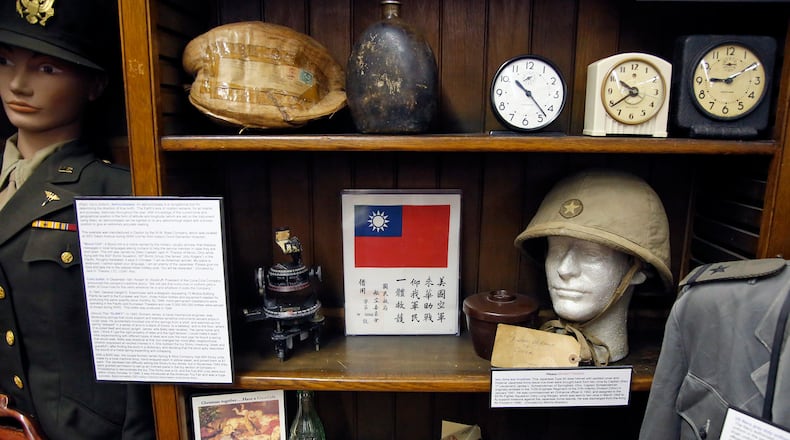Now, the fraudulent charity is one of several that finds itself in the crosshairs of the Federal Trade Commission and the state attorneys general of Ohio, Florida, California, Maryland, Minnesota and Oregon. The FTC and the six attorneys general have launched a campaign called "Operation Donate with Honor" to combat giving to charities falsely claiming to be helping veterans and members of the military.
» RELATED: U.S. senators keep close eye on VA as GI Bill changes take effect
Along with “Help the Vets,” the campaign identifies eight other charities that have all been sued for lying to donors.
Neil Paulson Sr. and his “Help the Vets” is now banned from soliciting charitable contributions, according to the FTC. Through a settlement with the FTC and the six state attorneys general, the organization has to pay its remaining $1.75 million in funds to a legitimate charity, according to Ohio Attorney General Mike DeWine’s office.
“Unfortunately there are some groups that only pretend to do this kind of work,” DeWine said in a prepared statement. “We want people to know the difference. Sham charities drain away money and resources that could be used by honest, legitimate organizations.”
DeWine's office has set up a web page where people who wish to donate to a charity can conduct research to make sure the place they are giving money to is a legitimate organization.
Donors should be wary of giving to a nonprofit only because of its “real-sounding” name, according to the attorney general’s office. The state also encourages donors to look up a charity’s IRS Form 990 to see what programs an organization runs and what it spends money on, among other things.
One local nonprofit that has been impacted by misleading veterans charities is the Miami Valley Military Museum on the grounds of the VA Medical Center in Dayton.
Fraudulent charities have created something of a ripple effect that makes people reluctant to donate to real ones, said Catherine Beers-Conrad, treasurer and spokeswoman for the museum.
» RELATED: Dayton VA to temporarily close gate, RTA eliminates 2 bus stops near medical center
Beers-Conrad, a retired Air Force sergeant, noticed people became less willing to donate when news broke two years ago about how the well-known Wounded Warrior Project spent lavishly on itself. People began telling her that they were not sure they should donate to the museum because they didn't trust the nonprofit to properly spend their money.
“I was really surprised that it came this far down the ladder,” Beers-Conrad said. “It affects everything. There’s only so much money to go around.”
Beers-Conrad and the museum staff regularly visit units at the Dayton Veterans Affairs Medical Center. During visits they host monthly birthday parties for patients and give cards to families with vets in hospice.
The ultimate fear, Beers-Conrad said, is that the donor reluctance caused by fake charities becomes widespread and eventually translates into a funding shortage for certain veteran nonprofits. Such a shortage would mean groups like the museum would not be able to continue the programs they have to help vets, she said.
That’s why Beers-Conrad was happy to hear that the government is cracking down on fake charities. If it didn’t, fraudulent nonprofits might get away with swindling more unsuspecting donors who think their money is actually going toward a good cause, she said.
“It really angers me,” she said. “It’s a sin to steal from anyone like that.”
FIVE FAST READS
• Good Samaritan Hospital officially closes down for good
• UD cuts ties with annual “Dayton 2 Daytona” trip
• State suing Dayton company for ‘shoddy work’
• Fairborn vet one of thousands pushed into debt by VA mistake
• Algae plaguing Ohio lakes could force Kasich to take executive action
THANKS FOR READING
The Dayton Daily News is committed to bringing you independent, in-depth local stories. Help support our journalism by signing up for a print or digital subscription.
Is it a fake chairity?
• Many sham charities have real-sounding names.
• Research the charity on the Ohio AG’s website.
• Look up a nonprofit’s IRS Form 990.
• Ask how much of your money will go to the charity.
SOURCE: Ohio Attorney General’s Office.
Fraudulent charities
The following organizations have been sued for lying to donors, according to the FTC.
• Help the Vets, Inc.
• American Disabled Veterans Foundation
• National Vietnam Veterans Foundation
• Healing American Heroes, Inc.
• Veterans Fighting Breast Cancer
• Military Families of America
• VietNow National Headquarters, Inc.
• Foundation for American Veterans, Inc.
• Healing Heroes Network
About the Author
